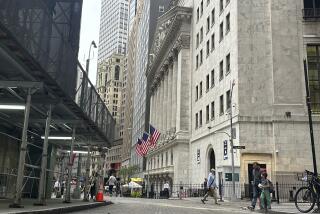TOP STORIES -- July 11-16
Stewart Sentenced to Five Months in Prison
Martha Stewart received a sentence of five months in prison plus five months’ home confinement, then emerged from the Lower Manhattan courthouse with an air of defiance -- and a sales pitch.
Stewart thanked what she said were the many thousands of people who had written or e-mailed their good wishes, suggesting that they continue their support “by subscribing to our magazine, by buying our products, by encouraging our advertisers to come back.”
As soon as news of her relatively brief sentence was out, shares of Stewart’s media company, Martha Stewart Living Omnimedia Inc., began soaring to their highest level since her March 5 obstruction-of-justice conviction.
U.S. District Judge Miriam Goldman Cedarbaum rejected Stewart’s request for a non-prison sentence of community service. She also imposed a $30,000 fine.
Cedarbaum granted Stewart the concession of allowing her to remain free pending an expected appeal of her conviction. Given the clogged calendar of the U.S. 2nd Circuit Court of Appeals, legal experts said it could be as long as two years before Stewart begins her prison term.
*
In Latest Vegas Deal, Harrah’s to Buy Caesars
Harrah’s Entertainment Inc. said it agreed to acquire Caesars Entertainment Inc., in a bid to create the world’s largest gambling enterprise and eclipse the proposed $4.8-billion acquisition of Mandalay Resort Group by Los Angeles billionaire Kirk Kerkorian’s MGM Mirage, a deal announced a month ago.
Harrah’s said it would pay $5.2 billion for Caesars -- $1.8 billion in cash and $3.4 billion in stock -- and assume $4.2 billion in debt. The boards of both Harrah’s and Caesars approved the deal, according to a source familiar with the talks.
If the deal passes the scrutiny of federal and state regulators, the combined business would control about 20% of the Las Vegas Strip, including six major properties -- Caesars Palace, Paris Las Vegas, the Flamingo, Bally’s, Harrah’s and the nearby Rio -- with nearly 17,000 hotel rooms, 9,200 slot machines and more than 500 table games.
*
Intel Profit Jumps; Margins Likely to Drop
Intel Corp. reported a near-doubling of its second-quarter profit, but the results were overshadowed by a warning that its gross profit margin for the rest of the year would be slightly lower than previously projected.
The world’s largest semiconductor maker attributed that to unexpectedly brisk sales of flash memory chips and motherboards, which are less profitable than its flagship chips. Although total sales and profit will rise as a result, the mix of products will make for a lower overall margin.
Intel said gross profit for the year would be 60% of sales, lower than an earlier forecast of 62%.
Earnings were $1.76 billion, or 27 cents a share, in the second quarter, up from $896 million, or 14 cents, a year earlier. Revenue rose 18% to $8.05 billion.
Revenue in the current quarter is expected at $8.6 billion to $9.2 billion, up from $7.83 billion a year earlier, the Santa Clara, Calif.-based company said.
*
Developers Set to Start Staples Center Project
A company controlled by Denver billionaire Philip Anschutz is ready to start work on a $1-billion commercial development around Staples Center in Los Angeles that would include a long-awaited hotel to serve the city’s convention center.
AEG, Anschutz’s entertainment and development company, could begin construction by the end of the year on the 4-million-square-foot entertainment, shopping and residential project, which would cover six blocks near Staples Center.
AEG has granted the development rights for a convention center hotel to Lew Wolff of Maritz, Wolff & Co. of Los Angeles, one of the world’s largest owners of luxury lodging properties. Wolff submitted a formal request for financial help to City Hall, seeking a loan, fee waivers and all of the hotel bed tax collected by the project in its first 20 years. Mayor James K. Hahn and other officials said they were open to considering a city role.
*
Home Prices Continue to Soar in L.A. County
Los Angeles County home prices posted their biggest increase in at least 15 years in June as the median surged 32.3% to a record $414,000.
June marked the first time that the county’s median price -- the point at which half the homes sold for more, half for less -- topped $400,000.
The steep run-up in prices has prompted concern that the region’s housing market, a major engine of the economy, may be caught up in a speculative bubble.
But so far, some key warning signs have yet to reach what experts consider to be dangerous levels, even as prices continue to rise at a sizzling pace.
“There is still no indication in these numbers that the market is turning,” said John Karevoll, an analyst at DataQuick Information Systems, a La Jolla firm that compiles the monthly housing data.
A lack of inventory that helped fuel this year’s steep increases appeared to be easing.
*
Southwest Airlines CEO Unexpectedly Retires
James F. Parker unexpectedly retired as Southwest Airlines’ chief executive, as the low-fare carrier posted a second-quarter profit that fell slightly short of analysts’ forecasts.
Parker, 57, cited unspecified personal reasons for retiring but said his decision was not health-related. He was succeeded by Gary Kelly, 49, who has been chief financial officer of the Dallas-based carrier for 15 years.
The CEO’s job at Southwest is part of a de facto triumvirate of leadership that includes Herbert Kelleher, the airline’s co-founder and chairman, and company President Colleen Barrett.
Southwest said its second- quarter net income was $113 million, or 14 cents a share, down 54% from $246 million, or 30 cents, a year earlier, when results included $143 million from a federal program to reimburse airlines for added security costs. Analysts had expected 16 cents a share.
*
OPEC Affirms Plans to Boost Oil Output
OPEC pledged to make good on its plan to pump 2% more oil next month, but the cost of crude in New York fell only slightly Thursday as attacks on Iraqi pipelines reignited supply fears. On Friday, U.S. light crude rose 48 cents to $41.25.
The Organization of the Petroleum Exporting Countries, whose members produce a third of the world’s oil, said that “market conditions remain essentially unchanged” since last month, when members agreed to raise the production ceiling in July by 2 million barrels a day and by an extra 500,000 barrels in August, if necessary.
The group boosted the official production total to 26 million barrels a day, beginning Aug. 1.
Analysts questioned whether much more oil would find its way to market. Ten of OPEC’s 11 members already are producing above their official limits, and all but Saudi Arabia are unable to boost output further, according to analysts. Iraq is not subject to quotas.
*
Consumer Prices Post 0.3% Increase in June
Consumer prices rose 0.3% in June, the government reported, a sharp slowdown from the previous month that reaffirmed expectations that the Federal Reserve will raise interest rates at a restrained pace.
Last month’s increase in the consumer price index compared with a 0.6% surge in May caused mostly by higher gasoline prices, the Labor Department reported. Excluding volatile energy and food costs, “core” prices rose only 0.1% in June, less than expected by many economists and down from 0.2% in May.
In the last 12 months, the CPI has risen 3.3% and core prices 1.9%. But analysts said both measures of inflation remained within a comfort zone that should allow the Fed to boost short-term interest rates at a “measured” pace.
Last month, the Fed boosted its benchmark short-term rate for the first time in four years, to 1.25% from 1%. Many economists expect the central bank to continue raising rates in quarter-point increments over the next year or so.
The next increase is expected when Fed policymakers meet Aug. 10.
*
Duke Settles With State Over Energy Charges
California officials said they reached a $207.5-million settlement with Duke Energy Corp. to end disputes from the 2000-01 energy crisis -- the latest in a series of deals to resolve conflicts with power suppliers and provide some relief to consumers.
The settlement reflects a push by the state to negotiate refunds for past overcharges rather than leave matters to the Federal Energy Regulatory Commission or rely entirely on lawsuits.
Electricity sellers have steadfastly denied wrongdoing during the energy emergency.
In the accord, Duke went further than federal regulators have demanded, agreeing to compensate major utilities for alleged overcharges in the summer of 2000 as well as emergency electricity purchases by the state Department of Water Resources.
The settlement with Duke includes $38.1 million for the summer of 2000 and $8 million for emergency purchases by the water resources agency.
In all, the settlement would provide $172 million in ratepayer benefits, California Atty. Gen. Bill Lockyer’s office said.
For a preview of this week’s business news, please see Monday’s Business section.
More to Read
Inside the business of entertainment
The Wide Shot brings you news, analysis and insights on everything from streaming wars to production — and what it all means for the future.
You may occasionally receive promotional content from the Los Angeles Times.










